Nvidia GeForce RTX 4070 Ti review: the first RTX 40 series GPU worth buying
It’s no bargain, but Nvidia decoupling this graphics card from the RTX 4080 was a good shout
Here it is, then, the RTX 4070 Ti – the 12GB RTX 4080 that wasn’t. "Unlaunching" this GPU, rebranding it, and releasing it for £100 / $100 less may have bruised egos at Nvidia, but at least it’s left us with an intriguing silicone prospect. Finally, there’s a high-end, DLSS 3-capable, Ada Lovelace architecture-based graphics card that doesn’t cost four figures.
Before anyone starts weeping with joy, however, a reality check. This is still yet another costly graphics card, with most board partner models (there’s no Nvidia Founders Edition for the RTX 4070 Ti) landing somewhere between the Radeon RX 7900 XT and the Radeon RX 7900 XTX on price. The version I’ve tested, MSI’s GeForce RTX 4070 Ti Suprim X 12G, will set you back £950 / $998, more than a one-third increase on the launch price of the RTX 3070 Ti back in 2021. And that’s with a relatively unenthusing 12GB of 192-bit VRAM, one of the specs that coiled eyebrows when this was revealed as an RTX 4080 variant.
Despite that, it does make a listenable case for itself as the RTX 40 series card to buy, at least until the likes of the RTX 4060 stop being so darned hypothetical. If the RTX 4070 Ti has a memory shortage, it didn’t show in any of our benchmarks, where it proved itself a decent 4K alternative to the RTX 4080 and an arguably superior option for futureproofed 1440p. It’s better for ray tracing than the RX 7900 XT as well, while being the current most "affordable" graphics card with DLSS 3 support. If you could mentally picture me doing air quotes there I’d appreciate it.
Also, as bulky as it looks, this MSI model is more practical than the RTX 4080 and RTX 4090 partner cards I’ve previously tested. For one, it actually fits in the RPS test rig’s new NZXT H5 Flow case without needing to hang the CPU cooler’s fans and radiator out the side, ready to comedically slice my toes off. It’s a heavyweight triple-slotter, make no mistake, but its 285W power consumption isn’t too thirsty and the three cooling fans kept it at a comfortable 63-67°c under sustained load. I like the looks, too: all sharped edged and angular.
RTX 4070 Ti review: 4K performance
Enough cooing at shapes, let’s see how this card runs. Although Nvidia (re)announced the RTX 4070 Ti as a deadly 1440p weapon, I’ve found it can settle in nicely at 4K, to the point of outperforming past GeForce juggernauts like the RTX 3090 and sometimes even the RTX 3090 Ti. GPUs that, in defence of the RTX 4070 Ti’s high cost, were even pricier at launch. Averaged across six of our benchmark games, the RTX 4070 Ti also works out at about 40% faster than the RTX 3070 Ti at 4K, so the gen-on-gen price jump is at least matched by a slightly above-proportional performance gain.
All that said, against the rest of the RTX 40 series and AMD’s latest Radeons, the RTX 4070 Ti does spend most of its time bringing up the rear:
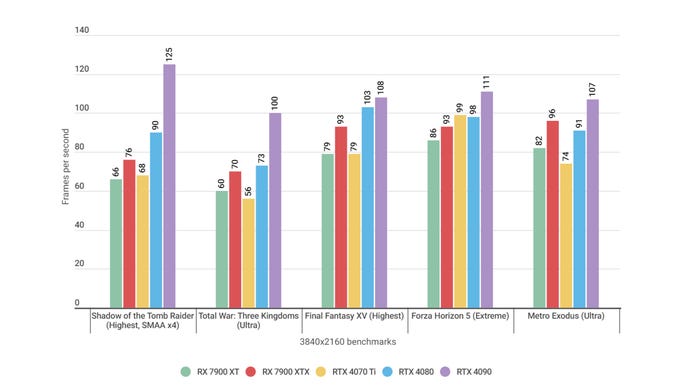
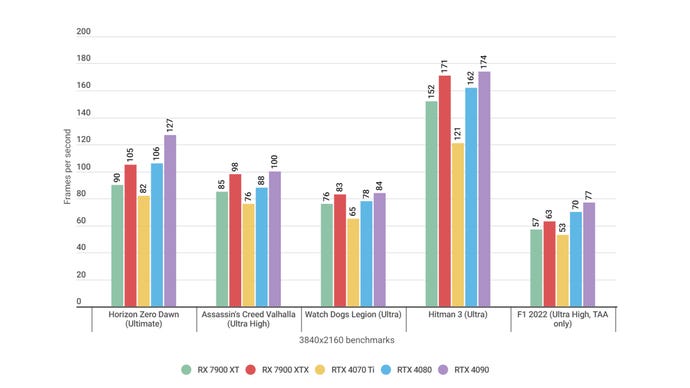
Then again, it’s very often just a few frames behind the RX 7900 XT, with its 20GB of VRAM, and sometimes – namely in Shadow of the Tomb Raider and Forza Horizon 5 – comes out ahead. Speaking of Forza, the RTX 4070 Ti somehow finished even faster than the RTX 4080, albeit only by a margin-of-error difference.
I also don’t think it’s too worrying that this is the only GPU of the five to make the occasional dip below a 60fps average, as it did in the Total War: Three Kingdoms and F1 22 benchmarks. Higher-scoring cards are more futureproofed, true, but Three Kingdoms is only a measly 4fps short of that gold standard, and in F1 22 you can just flick on DLSS upscaling for a free framerate boost. Most games will, evidently, run well above 60fps at 4K on this card, and diminishing returns means FPS differences above this point get harder to perceive. Combined with the fact that all these competing GPUs are either around the same price or much more expensive, the RTX 4070 Ti actually comes out looking like a fair choice for good-quality 4K. At the very least, it doesn’t disappoint.
That’s not to say it’s the best value, as the RX 7900 XT is generally faster on purely rasterised performance. The RTX 4070 Ti counters this with a greater affinity for ray tracing, as AMD’s RDNA 3 architecture just isn’t as prepared to tank this feature’s performance impact as well as Nvidia’s Ada Lovelace design. Case in point, Metro Exodus. On the RTX 4070 Ti, this averaged 74fps on standard settings, and 49fps with Ultra-quality ray tracing enabled. That’s a drop of 33%. The RX 7900 XT had a higher starting point of 82fps, but ended up performing worse with ray tracing switched on, scoring 38fps – a 54% drop.
Watch Dogs Legion also demonstrates this difference, with the RTX 4070 Ti losing 46% of its frames with ray tracing (65fps to 35fps). That looks bad but the RX 7900 XT downright collapsed, losing 60% by dropping from 76fps to 30fps.
As I said in our RTX 4080 review, I’m not sure that ray tracing is available in enough games for RT power to make or break a graphics card. But it is notable that, depending on whether you plump for these settings, the RTX 4070 Ti can end up significantly faster than the RX 7900 XT after all. And since we’re looking at feature support, it could be weeks or months before AMD has an answer to the sheer FPS-multiplying strength of DLSS 3.
It will in time, with FSR 3.0, though for now the frame generation witchcraft of DLSS 3 is unique to the RTX 40 series. Check out the graph below for how this can take a maxed-out Cyberpunk 2077 from painfully slow to double or even triple the framerate:
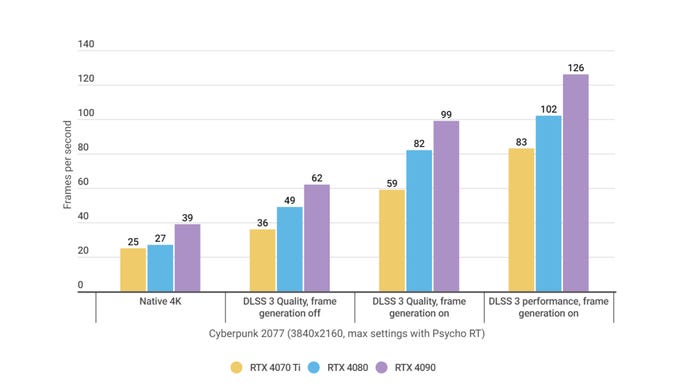
Now, the RTX 4070 Ti doesn’t benefit as emphatically as its big brothers do. 59fps with upscaling on Quality will look good, but one of the catches to these free, AI-generated frames is that you don’t 'feel' them; unlike a rise in traditionally rendered frames, you generated frames are purely visual and don't contribute to a greater sense of control responsiveness. 59fps will therefore have the tactile quality of 36fps (the GPU’s result with frame generation off). This is naturally less of an issue on the RTX 4080 and RTX 4090, which can render enough frames the old fashioned way to maintain a smooth feel regardless.
Still, you can always lower the upscaling quality to get the extra rendered frames you need, and at 4K it’ll still look nice and sharp. With DLSS 3 set to Performance mode, I got 55fps without the AI frames – enough for a much sharper mousefeel – with frame generation boosting the visuals to a lovely 83fps. Much better.
RTX 4070 Ti review: 1440p performance
Provided you have a 144Hz/165Hz monitor to take advantage of it, the RTX 4070 Ti is more than viable for top quality 1440p. With the exception of a disappointing Metro Exodus result, it’s more competitive with its costlier peers at this resolution, even coming within a few frames of the RTX 4080 across multiple games.
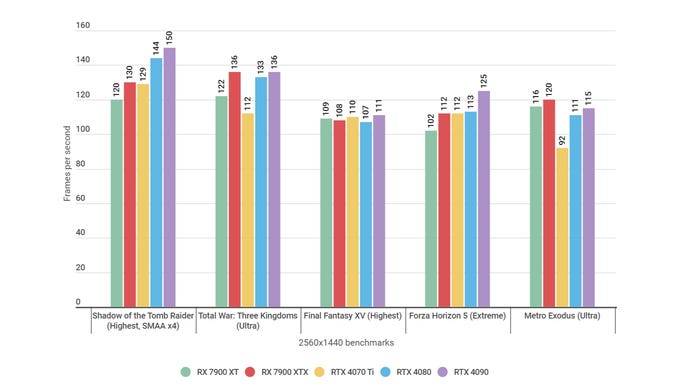
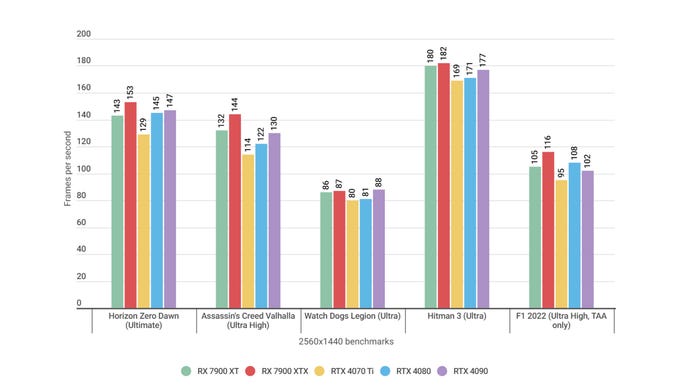
Compared to its 4K results, this GPU closes the gap in Final Fantasy XV, Watch Dogs Legion, and Hitman 3, while also catching up to the Radeon RX 7900 XTX – another ostensibly higher-end graphics card – in Shadow of the Tomb Raider. Considering that the RTX 4070 Ti is the cheapest card here, it does pretty well to avoid being the slowest in nearly half of the games tested.
DLSS 3’s frame generation isn’t as useful when you’re already pumping out such high framerates, so it’s less of a killer app at 1440p than it is at 4K. But DLSS upscaling is still the best of its kind, and again, Ada Lovelace still delivers better RT performance than anything with a Radeon badge. The architecture, not her ghost.
That also-ran Metro Exodus result? With Ultra RT effects switched on, the RTX 4070 Ti only needs to weather a 15% performance hit, dropping from 92fps to 78fps. The rival RX 7900 XT suffers a much harsher 42% drop, 116fps to 67fps, and even the Radeon RX 7900 XTX loses 32% by falling from 120fps to 82fps. That does leave the latter as the fastest overall with ray tracing, but only by 4fps on average, and that’s not really worth the hundreds of pounds in extra cost.
Applying ray tracing to Watch Dogs Legion even saw the RTX 4070 Ti steal a little lead, by only dropping 28% of its frames (80fps to 58fps). By contrast the RX 7900 XTX fell by 34% (87fps to 57fps) and the RX 7900 XT by 40% (86fps to 52fps).
The RTX 4080 is faster than all three, of course, and copes even more comfortably with the strain of ray tracing. And, without wanting to speculate too much, one suspects that the RTX 4070 Ti would come out these results looking worse if it still had its RTX 4080 branding and original pricing.
But it doesn’t, and Nvidia opening up some space between this and the RTX 4080 makes the RTX 4070 Ti both more palatable on performance and simply – though crucially – easier to actually buy. The specific FPS numbers are lower, but there’s still that satisfying sense of finding a cheaper alternative that, broadly, does everything the fancy model can do: good 4K, great 1440p, ray tracing, DLSS 3, etcetera. I think if this launched as a 12GB RTX 4080, I’d just be wondering why you wouldn’t pay slightly more for the full fat version.
It’s still a luxury graphics card, to be sure, and you really should approach it as something like a cut-price RTX 3090 successor rather than another upper-mid-range GPU like the RTX 3070 Ti technically was. I’m still moody that neither Nvidia nor AMD have presented any new GPUs in these lower brackets yet, but if you do want something new-new, the RTX 4070 Ti should put a smile on your face.







